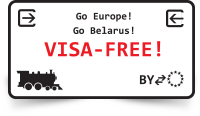PASOS
Paving the road towards visa-free travel between the Eastern Partnership countries and the EU.
PASOS (Policy Association for an Open Society, Prague) is an initiator and organiser of this project. This association aims to promote and protect democracy, human rights and open society values – including the rule of law, good governance, and economic and social development – by supporting civil society organizations that individually and jointly foster public participation in public policy issues at the European Union level, in other European and global structures, and in the wider neighbourhood of Europe and Central Asia.
The goal of the project is to create a tipping-point for the achievement of visa-free relations between the Eastern Partnership countries and EU member-states, and in the process to upgrade the legal and policy processes in the EaP countries and promote closer integration and people-to-people exchange and contacts between the Eastern Partnership countries and EU member-states.
The project will seek to achieve this goal by:
- raising awareness among policymakers, civil society and media in the EaP countries, and fostering national and international engagement in policy debates on reducing barriers to people-to-people exchange between the EaP countries and the EU;
- conducting comparative analysis of the experience of securing visa-free travel to the EU for other countries, especially in the western Balkans, and policy dialogue among key stakeholders in the EaP countries, drawing up strategies to agree on a country-by-country basis the core questionnaire, criteria, and needs assessment to meet the technical criteria in the visa dialogue process and/or an eventual European Commission roadmap/action plan for visa–free travel;
- policy dialogue and independent monitoring of progress towards meeting the criteria, shaping governments’ policies, legal framework and institutions to modernise practices in the fields of border security, international co-operation on migration and organised crime, and other areas necessary to foster closer integration with the EU through enhanced co-operation and visa–free travel;
- policy recommendations for EaP governments with a view to meeting the criteria, and for the EU concerning provision of technical assistance to assist EaP governments in meeting the criteria;
- advocacy at national and international level (EU member-states as well as EU institutions) for visa-free travel for EaP countries, including a strategy of promoting the positive benefits to EU members in terms of enhanced co-operation on security and cross-border crime, and dispensing myths among the wider EU public that visa regimes keep out criminal elements (“Mafia bosses do not wait in queues for visas. Ordinary citizens who have never visited Paris, Berlin or Budapest can ill afford the visa costs, yet still must wait with no certainty that they will receive a visa.”)
A full copy of the project’s plan, objectives, and methodologies you can here: Download this document.
Results of a comparative readiness assessment of the Eastern Partnership countries to the visa liberalisation according to the EU criteria will be released as an outcome of the project.
The participants and partners of this project are:
- Centre for Economic and Social Development – Azerbaijan
- International Centre for Human Development – Armenia
- The Belarusian Institute for Strategic Studies, The Office for a Democratic Belarus – Belarus – Belgium
- Caucasus Institute for Peace, Democracy and Development – Georgia
- European Stability Initiative – Turkey – Germany – Belgium
- Institute for Development and Social Initiative Viitorul – Moldova
- Centre for Research and Policy Making – Macedonia
- Institute for Development and Social Initiative Viitorul – Moldova
- Public Initiative “Europe without Barriers” – Ukraine
Project methodology
The project methodology encompasses three phases:
Phase 1 – Preparatory activities
The first phase aims at setting the framework for project implementation. The activities within this phase will include recruiting experts, and implementing organisations, finalising the lines of reporting and timelines, commissioning a baseline research study for each country, and a mapping of EU member-states’ attitudes towards visa liberalisation for the EaP countries. The activities will be launched with an initial seminar to be held in Istanbul in September 2010. During this initial period of project implementation, a training needs analysis will be conducted vis-à-vis the stakeholder groups identified in the baseline study as significant pressure groups for visa policy debates in each individual country.
The project outputs in this phase will include:
a) Training in comparative aspects of the western Balkans visa liberalisation process (methodology and advocacy);
b) Training on methodology for baseline studies;
c) Analytical baseline study covering all six countries;
d) Analytical baseline study covering the EU;
e) Compendium/glossary of relevant visa relations materials;
f) Preparation of training needs analysis (TNA) of the key stakeholders in the six EaP countries.
This phase of the project will last for six months.
Phase 2 – Research, monitoring and capacity building
The second phase of the project encompasses activities from the three core components of this project: research, capacity building and monitoring. In this phase, the following will be conducted:
a research methodology for individual in-depth country studies will be developed;
research will be conducted;
analysis will be produced;
comparisons among countries will be made.
It is important that in this phase the researchers’ capacities will be built in the following areas:
research methodology,
monitoring of implementation,
policy recommendations for both EaP countries and EU, and
advocacy.
To address the technical criteria, the fulfilment of which will be a condition for visa liberalisation, a methodology for monitoring implementation of the criteria, a monitoring plan of activities and a monitoring report (both country-specific and a comparative one) will be produced within this phase of the project.
This phase of the project will also include (see below in further detail):
Advocacy Guide Book on Understanding and Influencing EU Policy-Making;
Training Needs Analysis (TNA);
No-visa websites in each EaP country, and joint site (www.novisa.eu – already registered by PASOS) linking the six sites.
Phase 3 – Advocacy
(a) EU level
Following the baseline studies in the six countries, and an approximate timeline for the fulfilment of technical criteria for visa liberalisation in the case of some countries (e.g. Moldova and Ukraine), the baseline study of EU member-states’ attitudes will enable the identification of the key supporters and opponents, and the drawing up of advocacy plans for building political support for visa liberalisation and realistic timelines for different countries (e.g. for Moldova and Ukraine, and possibly Georgia, in the first instance).
The indepth country research will further refine the stakeholder analysis, as well as identify more explicitly policy areas/technical criteria where policy recommendations (not only to EaP governments, but also to EU) have most scope for impact.
Advocacy plans will be built into the design, policy recommendations, and timing of publication of research results, and will include off-the-record meetings and, where appropriate, public events in Brussels and/or target EU countries (doubters/supporters), e.g. Germany and Poland. Researchers/advocacy partners will be recruited from the selected EU countries (chosen on the basis of the EU baseline study) to conduct analysis and advocacy with a view to promoting in the selected EU countries the case for visa liberalisation among decision-makers/opinion-formers as necessary.
These advocacy plans will not be tied to promotion of visa liberalisation in all six EaP countries if it is clear that in the first phase only one or two countries are at a stage where EU level advocacy has a realistic chance of influencing outcomes (e.g. Ukraine, Moldova, and possibly Georgia).
Target countries and institutions are likely to include:
- EU Ministers of Interior
- Members of Parliament from key EU countries blocking visa liberalisation
- European Commission – Directorates for Justice and Home Affairs, and Enlargement and European Neighbourhood Policy
- European Parliament – relevant committees
- Hungarian EU Presidency, January-June 2011
- Polish EU Presidency, July-December 2011
- Germany
- Visegrad Group
- Influential media commentators in key countries
(b) EaP country level
The EaP counry partners will develop an advocacy plan that will be tailor-made for the respective country. Appropriate training will have been provided in the light of the TNA to ensure that the country partners apply various advocacy techniques that will extend to, and not only to: meetings (where appropriate off the record), workshops, debates, talk-shows, newspaper columns and/or articles, op-ed, lectures and etc.
In this phase, meetings presenting the Western Balkans experience to the state actors in every target country will be organised with the participation of officials from the Western Balkans countries (e.g. Macedonia, Serbia, and Montenegro) and EU new member-states (Romania, Bulgaria).
The debate would also include consideration of wider engagement with the EU in terms of greater co-operation, including technical assistance from the side of the EU/EU members in the field of meeting the criteria for visa liberalisation.
Learn more about the project at www.novisa.eu























